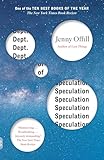My family and I walked to a few different stores in our neighborhood today, in search of bananas and fresh air. I love bananas and we’d run out, but there aren’t bananas anywhere right now. Finally I found some on the counter next to the register in a liquor store: 75 cents each. I bought four. Across the country the person I love most in the world, after my own children, is getting home from rehab. I realize an AA meeting is a gathering of more than 20 people, and I worry they’ve all been canceled.
I loved Jenny Offill’s Dept. of Speculation, but I wasn’t sure what to make of Weather. It didn’t seem to be about anything. It’s told in a similar format as Dept. of Speculation—little paragraphs about the narrator’s job (a librarian), her husband, her son, her neighbors. I had heard the book was about climate change, or maybe it was about addiction. It didn’t seem to be about any of these things, really, but I kept reading. Usually, I read a little before I go to sleep. I don’t have much time. I have two children, a five-year-old daughter and a 10-month-old son. I work. I try, and fail, to write. Like everyone else, I’ve been following the coronavirus stories this month. I just lived day-to-day, because coronavirus or not, that’s all I’m capable of right now.
 So I read Weather, and didn’t think too much about it. The narrator meets some cats, avoids other moms at her son’s school. She takes a car service, she takes the bus. She has funny one-liners. She feeds the dog. She starts to work with an old mentor from grad school, a woman named Sylvia who is an expert on climate change. Her brother, a recovering drug addict, meets a woman and they have a baby. Interspersed in the text are handy tips for the end of the world. How to make a candle out of a tin of tuna. How to fish in a river with nothing but your shirt and the spit in your mouth.
So I read Weather, and didn’t think too much about it. The narrator meets some cats, avoids other moms at her son’s school. She takes a car service, she takes the bus. She has funny one-liners. She feeds the dog. She starts to work with an old mentor from grad school, a woman named Sylvia who is an expert on climate change. Her brother, a recovering drug addict, meets a woman and they have a baby. Interspersed in the text are handy tips for the end of the world. How to make a candle out of a tin of tuna. How to fish in a river with nothing but your shirt and the spit in your mouth.
I order diapers, formula, soap, baby wipes, baby food, and vitamins. We go to grocery stores and buy toilet paper, flour, yeast, canned tomatoes, rice, beans, wine, chips, chocolate. I order refills of my Xanax, Prozac, and birth control. The narrator of Weather asks, where should we go, where will my son be safe from the ravages of climate change? And her mentor answers: nowhere. Nowhere will be safe. Want to be safe? Become rich.
My kids and my husband went to sleep and I stayed up late to finish the book. Los Angeles Unified School District canceled school. A friend is scared she has it, the virus, but she can’t get tested. She’s worried about her parents. My mom is 65 and won’t stop working. She buys groceries for my 95-year-old grandma. My loved one is coming home from rehab. Somewhere in the middle of the book, we learn the narrator dropped out of graduate school to keep her brother alive, to help him recover from drug addiction. Later we learn she’d keep him on the phone late, and then instruct him she had to tell him something tomorrow morning, so he wouldn’t kill himself during the night.
It’s at this point in the book, I realize this is what the book is about: everyday living during the end of the world. The futility, the impossibility, the absurdity of trying to keep people alive, trying to keep them safe.
My loved one comes home from rehab and drives around the city, trying different meetings. They are all canceled. He calls me in between each attempt. I get off the phone and I cry, because there’s nothing I can do. My daughter wants to know why I am crying. She cries with me. Then the baby starts crying, because he cries whenever she does. I pick him up and hold him close. We blow raspberries at each other. Everyone is smiling again.
The narrator loves her husband, her son, her dog. She just continues to go about living her life the best she can, showing up at work, helping her brother, newly sober, with his infant daughter.
My family and I go for a walk and I stop in at a corner grocery store, which has been in the neighborhood for more than 60 years. They keep open tabs for all the people in the neighborhood who need it. When someone needs food and can’t afford it, this place gives it to them. They don’t have the bananas I am looking for, but I give them a $20 bill, which is all the cash I have, and tell them to use it to help someone pay for food. I don’t know what else to do. I try not to let my daughter see me cry as we walk home.
For more information about online AA meetings, click here and here. For more information about Al-Anon, click here. Please reach out to anyone you know in AA or Al-Anon for information about Zoom meetings.









